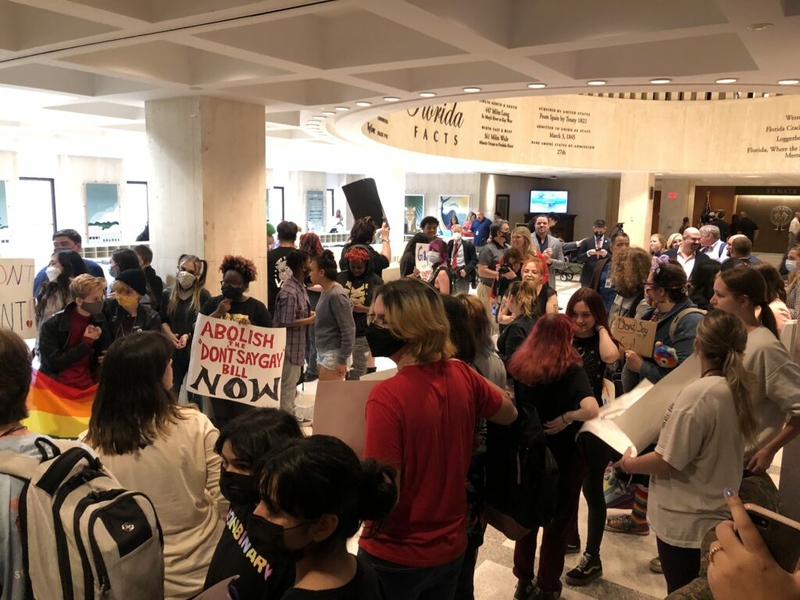Activists still fear limits on protests, free speech at FL Capitol despite revisions to proposal

Florida’s Department of Management Services has clarified a controversial rule that potentially threatened to limit some protests in the Florida Capitol following widespread criticism from activists and protest organizers.
But some activists and organizers who provided public comments at a meeting Thursday are not fully satisfied with the changes, and they argue that the new revisions still threaten to chill free speech.
The rule now reads, in part:
“Because the Capitol Complex is often a destination for children learning about their State government, visual displays, sounds, and other actions that are harmful to minors…, or which include gratuitous violence or gore are not permitted in any portion of the Capitol Complex that is not a traditional public forum.”
Compare that to the previous rule:
“Because the Capitol Complex is often a destination for children learning about their State government, visual displays, sounds, and other actions that are indecent, including gratuitous (sic) violence, gore, and material that arouses prurient interests, are not permitted in any portion of the Capitol Complex that is not a traditional public forum.”
The phrase “harmful to minors” now stands in place of the previous wording “materials that arouses prurient interests,” which was criticized by activists for being vague.
The language “harmful to minors” refers to Florida Statutes that outline definitions of topics such as “sexually oriented materials” and “nudity,” among other terms.
The previous rule prohibited visual displays, sounds, and other actions “that are indecent,” but that phrasing has been struck out in the new rule.
Previously, it was not clear which areas of the Florida Capitol Complex were included in this rule and which were excluded, leading to concerns as to which common areas for protests would have those limitations.
The term “traditional public forum” was not defined in the original version of the rule. The new language now says that:
“For purposes of the Capitol Complex, the parks, outdoor memorials, or similar public spaces that qualify as traditional public forums are the Capitol Courtyard, the North Plaza, the Historic Capitol Front Steps, the Old Capitol Steps, the South Plaza, the Vietnam War Memorial, and Waller Park.”
But even the new rule language leaves out a common protesting location: the 4th Floor rotunda located inside the Capitol Building, which sits between the House and Senate Chambers.
Protesters of all sorts of causes use the 4th floor rotunda to get as close to the state legislative process as possible.
On Nov. 22, anti-abortion activists gathered on the 4th floor as lawmakers convened for the regular organizational session, chanting for them to end abortion in Florida. Protesters could be heard from inside in both the House and Senate.
In March, high school students filled the 4th Floor shouting “F*** DeSantis” in protest of the Florida Legislature passing restrictions on classroom discussions of LGBTQ+ topics. These chants could also be heard from inside the legislative chambers.
It’s not clear how the new rule will affect protesters on the 4th floor. The Phoenix reached out to DMS for clarity and is awaiting response.
The Thursday meeting discussing the rule, received over an hour of public comments.
But an issue arose: with little notice, public commenters were not prepared to speak on the new language because they were unaware of the changes.
“The whole reason for providing good notice for a meeting of this significance is so that people can prepare effectively to represent their own views and the folks they represent,” said Meg Baldwin, previously the executive director of a domestic violence shelter, now an abortion rights advocate.
“And when changes are provided at the meeting, as they were today, it really defeats the purpose of those notice rules. If not to the letter, than to the spirit of providing adequate notices,” she continued. “Sadly it’s another way of impeding people’s ability to speak effectively to a rule.”
Baldwin said that some areas of the rule were “improved” by the changes, but she will be submitting additional written comments on the current form of the rule.
“I was relieved, but not comforted, by the fact that some of the restrictions are still, I think, are unwise and, likely, unlawful,” she said.
The written comment period for the updated rule is open until Dec 8.








